“We lived in an empty space. We lived in the dark.” Alleged chief executioner testifies on 1st January Dam
The Defense team had one session to finish their cross-examination of witness Mr. Keo Loeur. The witness they heard next was the last one related to the 1st January Dam. This witness had been referred to by a prior witness as a “chief executioner.”
The day started off with a meaningful and theatrical exchange between Victor Koppe, defense counsel for Nuon Chea, and Judge Lavergne. The exchange at its core was on the still pending decision of how the Chamber will allow torture tainted confessions. (You can read a summary of the oral argument on this matter before this Chamber here.)
Mr. Koppe was attempting to ask the witness Mr. Loeur whether he knew of the alleged storage of more than 1,000 tons of food stored in Anlong Kan Gan for their use in a purported rebellion. Judge Lavergne asked him to lay the foundation for his question–to point to the source on which he was basing his question.
Mr. Koppe said he wasn’t making these things up.
Judge Lavergne retorted: “Let us be serious, Mr. Koppe, do you have a document?”
When Mr. Koppe said he did not, Judge Lavergne said: “So in that case all the questions are fruit of your imagination.”
Koppe shrugged and said: “My imagination is very big.”
“The problem is,” Judge Lavergne rebuked him, “that in a court of justice imagination doesn’t serve any purpose. We have to rely on facts and they have to be supported by documents.”
“Are you sure,” Judge Lavergne then asked, “ that you have not been reading any confessions from S-21?”
Mr. Koppe said that he had read many confessions as well as other documents in the case file.
Judge Lavergne then suggested that if Koppe didn’t have any documents he move on to another line of questions.
Koppe said his time was up anyways and rested his cross-examination of this witness.
__
Ms. Anta Guissé, defense counsel for Khieu Samphan, then took the floor.
She started by trying to understanding the alleged meeting that Mr. Loeur had attended where Ta Oeun had said he wanted to overthrow the regime.
After the cross examination, it is still not clear whether Mr. Loeur attended the meeting himself or just heard about it when the S-21 confessions of Ta Oeun was played over the speakers to explain why they had been arrested.
Mr. Loeur couldn’t confirm whether all the soldiers form Division 310 (which one accounts has at over 6,000) or some soldiers attended the meeting.
Mr. Loeur said that he did not know the details of the meeting but that before the meeting he had seen weapons being shipped in front of Calmette hospital and that his unit Ka 4 was tasked with packaging the food.
Differing from what he had said before, Mr. Loeur said he had gone for tempering at Anlong Kang Ghan. Ms. Guissé then asked if that meant he had never gone to Khmmounh Kop Sarauv. Mr. Loeur only said that he didn’t come back to Khmoun after that. Ms. Guissé didn’t press the point.
Mr. Loeur said that he had never met soldiers from Division 450 or Division 603 in the battlefield, though he had met some soldiers from 450 when he arrived at Kampong Chhnang Airfield.
Mr. Loeur also confirmed that he saw a helicopter land at the airfield while he was working there but couldn’t say who was on it.
___
Mr. Kong Sam Onn, Co-Lawyer for Khieu Samphan, was able to clarify through the testimony of Mr. Leor that soldiers wore a military uniform that was khaki colored while the workers all wore black.
Mr. Loeur had said before that all the high cadres at the airport had black.
To Mr. Onn he clarified that the security guards at the airport wore Khaki and “tucked their shirt under.”
Mr. Loeur also clarified that he only saw the secret caves where military airplanes were hid when the regime fell and he was fleeing the worksite.
With that Mr. Loeur’s testimony, related to the Kampong Chhnang Airport was concluded.
—
The Court then went back to the 1st January Dam segment of the trial –you can read about this worksite and the alleged crimes that were committed there here — to listen to this witness, which was the last one reaming from that segment of the trial.
The witness was formerly identified confidentially, by other witnesses before the Chamber, as 2TCW-830.
The name of the witness is Mr. Yean Lon (យាន លន់). He can’t recall what year he was born but he said he was 73 years old. This witness had a lawyer present with him throughout his testimony.
Mr. Lon was born in Khvaek village, in Kampong Thma commune, in Santuk District in Kampong Thom Province.
Mr. Seng Leang, Deputy Prosecutor, started the examination of Mr. Lon. For the first part of the examination Mr. Lon did not add to the testimonies that had been given before on the January 1st Dam worksite.
“While I was working at the 1st January Dam site,” Mr. Loeur said “I had not time to rest. I carried earth and other people also carried earth and I was doing very hard labor at that time. In that regime at that worksite, workers were in pain and were suffering. We were assigned to work day and night without break and the work was very intensive.”
Mr. Lon also said that the work quota was 4 meters of cubic earth per person per day and that if they did not complete it they would be in trouble.
Mr. Lon did testify to a fact that the Chamber had not heard before. Mr. Lon said that there were small wooden latrines at the 1st January Dam site. He said though, that these were not enough for the number of workers. and the sewage and garbage was never taken out.
Mr. Lon also said that as far as he knew no one died at the 1st January Dam Worksite.
Mr. Lon also retracted from his OCIJ statement where he had stated seeing Khieu Samphan.
His OCIJ statement was read aloud where he had said:
“I saw Khieu Samphan visit the worksite.. rather when he came to visit I was about 20 meters away from him. I do not recall that visit. But I believe that I saw him in 1978. I knew it was him as I was told that it was him. There were many people that were escorting him and I heard him make a order through the loudspeakers to the militia men to order the workers to work harder and faster. “
In the testimony before the Chamber, Mr. Lon retracted and said that at the time he did not know who Khieu Samphan was and that he only heard people talking about him. He said it was very dusty and that it was difficult to see who was go and that he was unclear if had given the order through the loudspeakers.
Then, Mr. Lon said that from what he could see that person was actually not Khieu Samphan.
Mr. Lon did confirm that militia men had rifles – Chinese made carbines.
—
Only when Mr. Dale Lysak, Assistant Prosecutor, confronted this witness with Uth Seng’s testimony (which you can about here) did Mr. Lon’s role and his testimony came into stark relief.
The testimony from Mr. Seng with which Mr. Lon was confronted was:
“There was a chief executioner named Lon. He had a bicycle and had a sword on his bicycle After the Vietnamese liberation (January 7, 1979] he was imprisoned and that’s why he survived. Otherwise the people would have killed him without doubt.”
Mr. Lon first confirmed that he had been imprisoned by the Vietnamese but that he was from the commune militia. He was there for the protection of his village.
Mr. Lysak then delicately put the question of whether he had executed people.
“Is it true that in order to survive you had to follow all orders, including orders to arrests and execute?” asked Mr. Lysak.
“Yes that’s what happened at the time.” Mr Lon responded. “If one disobeyed the instructions that person would be dead. If we poked our finger into their affairs one would be dead. That’s what happened on the ground. We had to strictly adhere to the instructions or otherwise would not be spared”
“What types of people were you ordered to kill?” Mr. Lysak continued.
“There was no need to have a type of people, as long as they were accused of making a mistake they would be killed,” Mr. Lon responded.
“Whether the offense was to steal rice,” Mr. Lon continued “or potato or any type of food, once the person was caught that person would not be spared. That’s what happened on the ground.
Once the starvation hit, that person would not resist it and resort to stealing and if they were caught they would be taken away to be killed.
We lived in a condition worse than that of the animals.. It would be difficult to imagine that some people survived the regime. We could hardly breathe, we did not have any type of speech, we were so afraid of making any type of mistake.”
Ms. Marie Guiraud, International Civil Party Lead Co-Lawyer then took the floor.
She asked how the militia was recruited:
“Those who showed respect to the Khmer Rouge were recruited,” Mr. Lon responded, “and of course we didn’t trust them and they didn’t trust us. They only recruited those who were uneducated illiterate so they would blindly follow their instructions.”
She then asked if he joined the militia voluntarily and in his response he said, perhaps inadvertently, that he had the authority to refuse the transfer of people.
“In fact didn’t want to join them but I was afraid as I was being monitored at that time. I was living with the villagers and I had sympathy with them as I noticed they did not have enough food to eat. I stole rice for them-they would be given only 3 cans cooked in a big pot for a lot of people.
We drilled a hole in the barn to give them the rice. As a result some of those people survived… There were some teachers among them that were requested to be transferred, and if I were to allow that, they would have been killed….I refused to honor that request and those teachers survived.
Here I’m being frank with you.
It was routine work for me to administer the militia…. And please don’t confuse me with the security officer… I was there to protect the lives of my villagers.
At that time even the village chief would not know when his turn would come.
We lived in an empty space. We lived in the dark. They put people to monitor everyone.”
Mr. Lon after being asked whether the militia was tasked with forcing people to work went on a tangent.
“If one experienced experienced the Pol Pot regime or the genocidal regime they would understand.. The young generation doesn’t believe that the 1st January dam was built by manual labor… they believe it was built by machines…. We were carrying earth,” Mr. Lon said.
Later on, close to the end of his examination by the Civil Party Lawyers he said:
“I believe everyone of you is aware of that regime and we try to prevent it from happening again. So we must hate that regime… The young generation is being indoctrinated that the regime must be hated.”
The defense counsel objects to relevancy of this testimony, the court takes a short break and Mr. Victor Koppe took the floor for the cross examination.
“I’m puzzled by your testimony, “ Mr. Koppe starts. On the one hand, Koppe says, you say you stole rice to gain sympathy for your villagers and in return they gave you chicken and rice. On the other hand, Mr. Send said that if you had not been arrested in 1979 you would have been killed “without fail.”
“Can you react to that statement?” Mr. Koppe asks.
Mr. Lon confirms that that is accurate. He would have been killed.
After some prodding, Mr. Koppe asks: “Were you an executioner?”
“No. I was not a murderer or a chief executioner,” Mr. Lon responded. “This individual did not know who was the chief executioner.. so he pointed the finger at me.”
“But he said he saw you,” Mr. Koppe continued “with knifes with dried blood, that you were one of the physical executioners.. Was he wrong or is he right?”
“At that time during he regime,” Mr. Lon answered “not only I resorted to do what I did, millions did what I did.. everybody was monitoring everyone else. It is unfair that I was the sole executioner.”
—
After some further questions from Liv Sovanna, Co-lawyer for the defense of Nuon Chea and Anta Guissé, defense counsel for Khieu Samphan, the court adjourned until tomorrow June 17th at 9 a.m.

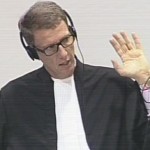
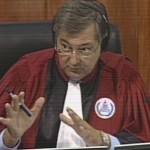
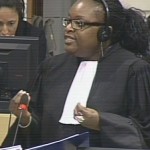
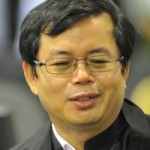
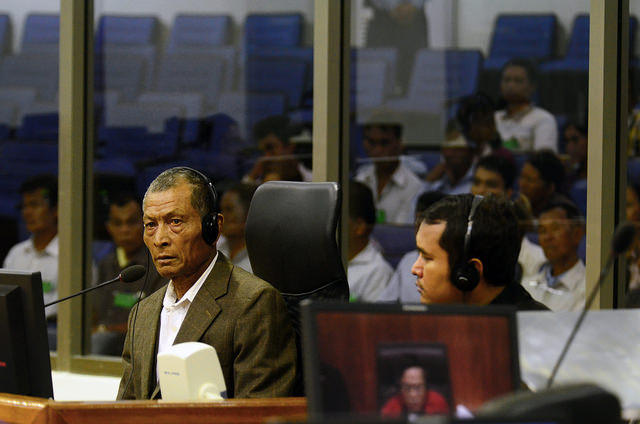
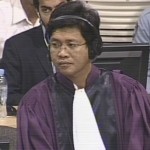
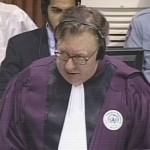
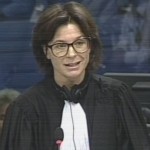
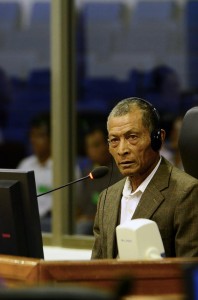
[…] In the first morning session the Trial Chamber finished the cross examination of witness Mr. Yean Lon (យាន លន់), the last scheduled witness on the 1st January Dam. (You can read about his testimony here.) […]